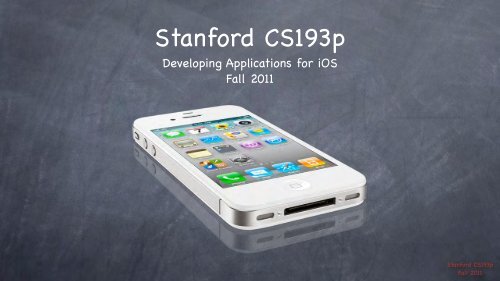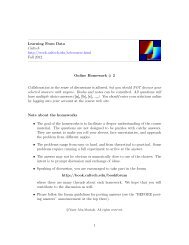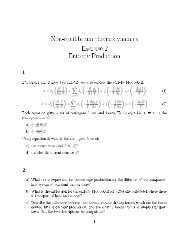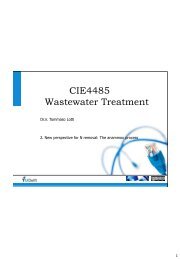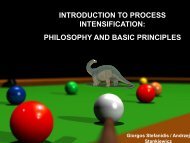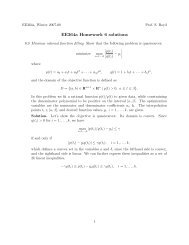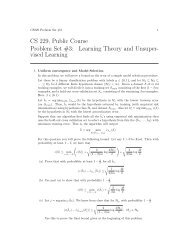Stanford CS193p
Lecture 1 Slides (September 27, 2011) - Marek Piasecki
Lecture 1 Slides (September 27, 2011) - Marek Piasecki
- No tags were found...
You also want an ePaper? Increase the reach of your titles
YUMPU automatically turns print PDFs into web optimized ePapers that Google loves.
<strong>Stanford</strong> <strong>CS193p</strong><br />
Developing Applications for iOS<br />
Fall 2011<br />
<strong>Stanford</strong> <strong>CS193p</strong><br />
Fall 2011
Today<br />
What is this class all about?<br />
Description<br />
Prerequisites<br />
Homework / Final Project<br />
iOS Overview<br />
What’s in iOS?<br />
MVC<br />
Object-Oriented Design Concept<br />
Objective C<br />
New language!<br />
Basic concepts only for today.<br />
<strong>Stanford</strong> <strong>CS193p</strong><br />
Fall 2011
What will I learn in this course?<br />
How to build cool apps<br />
Easy to build even very complex applications<br />
Result lives in your pocket!<br />
Very easy to distribute your application through the AppStore<br />
Vibrant development community<br />
Real-life Object-Oriented Programming<br />
The heart of Cocoa Touch is 100% object-oriented<br />
Application of MVC design model<br />
Many computer science concepts applied in a commercial development platform:<br />
Databases, Graphics, Multimedia, Multithreading, Animation, Networking, and much, much more!<br />
Numerous students have gone on to sell products on the AppStore<br />
<strong>Stanford</strong> <strong>CS193p</strong><br />
Fall 2011
Prerequisites<br />
Most Important Prereq!<br />
Object-Oriented Programming<br />
CS106A&B required, CS107 recommended<br />
Object-Oriented Terms<br />
Class (description/template for an object)<br />
Instance (manifestation of a class)<br />
Message (sent to object to make it act)<br />
Method (code invoked by a Message)<br />
Instance Variable (object-specific storage)<br />
Superclass/Subclass (Inheritance)<br />
Protocol (non-class-specific methods)<br />
You should know these terms!<br />
If you are not very comfortable with all of<br />
these, this might not be the class for you<br />
Programming Experience<br />
This is an upper-level CS course.<br />
If you have never written a program where you<br />
had to design and implement more than a<br />
handful of classes, this will be a big step up in<br />
difficulty for you.<br />
<strong>Stanford</strong> <strong>CS193p</strong><br />
Fall 2011
Assignments<br />
Weekly Homework<br />
7 weekly assignments<br />
Assigned Thursday after lecture<br />
Due the following Wednesday at 11:59pm<br />
Individual work only<br />
Homework graded ✓, ✓+ and ✓- based on<br />
Required Tasks and Evaluation criteria<br />
Lots of extra credit available, bank it<br />
Only 3 “free” late days per quarter<br />
#1 fail: falling behind on homework<br />
Final Project<br />
3 weeks to work on it<br />
But weighted like 4 weeks of homework<br />
Proposal requires instructor approval<br />
Some teams of 2 might be allowed<br />
Keynote presentation required (3 mins or so)<br />
<strong>Stanford</strong> <strong>CS193p</strong><br />
Fall 2011
iOS<br />
Cocoa Touch<br />
Media<br />
Core Services<br />
Core OS<br />
Core OS<br />
OSX Kernel<br />
Mach 3.0<br />
BSD<br />
Sockets<br />
Security<br />
Power Management<br />
Keychain Access<br />
Certificates<br />
File System<br />
Bonjour<br />
<strong>Stanford</strong> <strong>CS193p</strong><br />
Fall 2011
iOS<br />
Cocoa Touch<br />
Media<br />
Core Services<br />
Collections Core Location<br />
Address Book Net Services<br />
Core Services<br />
Core OS<br />
Networking<br />
File Access<br />
SQLite<br />
Threading<br />
Preferences<br />
URL Utilities<br />
<strong>Stanford</strong> <strong>CS193p</strong><br />
Fall 2011
iOS<br />
Cocoa Touch<br />
Media<br />
Core Services<br />
Core OS<br />
Media<br />
Core Audio<br />
OpenAL<br />
Audio Mixing<br />
Audio Recording<br />
Video Playback<br />
JPEG, PNG, TIFF<br />
PDF<br />
Quartz (2D)<br />
Core Animation<br />
OpenGL ES<br />
<strong>Stanford</strong> <strong>CS193p</strong><br />
Fall 2011
iOS<br />
Cocoa Touch<br />
Media<br />
Core Services<br />
Core OS<br />
Cocoa Touch<br />
Multi-Touch<br />
Core Motion<br />
View Hierarchy<br />
Localization<br />
Controls<br />
Alerts<br />
Web View<br />
Map Kit<br />
Image Picker<br />
Camera<br />
<strong>Stanford</strong> <strong>CS193p</strong><br />
Fall 2011
Platform Components<br />
Tools<br />
Xcode 4<br />
Instruments<br />
Language<br />
[display setTextColor:[UIColor blackColor]];<br />
Frameworks<br />
Foundation<br />
Core Data<br />
Map Kit<br />
UIKit<br />
Core Motion<br />
Design Strategies<br />
MVC<br />
<strong>Stanford</strong> <strong>CS193p</strong><br />
Fall 2011
MVC<br />
Controller<br />
Model<br />
View<br />
Divide objects in your program into 3 “camps.”<br />
<strong>Stanford</strong> <strong>CS193p</strong><br />
Fall 2011
MVC<br />
Controller<br />
Model<br />
View<br />
Model = What your application is (but not how it is displayed)<br />
<strong>Stanford</strong> <strong>CS193p</strong><br />
Fall 2011
MVC<br />
Controller<br />
Model<br />
View<br />
Controller = How your Model is presented to the user (UI logic)<br />
<strong>Stanford</strong> <strong>CS193p</strong><br />
Fall 2011
MVC<br />
Controller<br />
Model<br />
View<br />
View = Your Controller’s minions<br />
<strong>Stanford</strong> <strong>CS193p</strong><br />
Fall 2011
MVC<br />
Controller<br />
Model<br />
View<br />
It’s all about managing communication between camps<br />
<strong>Stanford</strong> <strong>CS193p</strong><br />
Fall 2011
MVC<br />
Controller<br />
Model<br />
View<br />
Controllers can always talk directly to their Model.<br />
<strong>Stanford</strong> <strong>CS193p</strong><br />
Fall 2011
MVC<br />
Controller<br />
outlet<br />
Model<br />
View<br />
Controllers can also talk directly to their View.<br />
<strong>Stanford</strong> <strong>CS193p</strong><br />
Fall 2011
MVC<br />
Controller<br />
outlet<br />
Model<br />
View<br />
The Model and View should never speak to each other.<br />
<strong>Stanford</strong> <strong>CS193p</strong><br />
Fall 2011
MVC<br />
Controller<br />
outlet<br />
?<br />
Model<br />
View<br />
Can the View speak to its Controller?<br />
<strong>Stanford</strong> <strong>CS193p</strong><br />
Fall 2011
MVC<br />
Controller<br />
outlet<br />
Model<br />
View<br />
Sort of. Communication is “blind” and structured.<br />
<strong>Stanford</strong> <strong>CS193p</strong><br />
Fall 2011
MVC<br />
target<br />
Controller<br />
outlet<br />
Model<br />
View<br />
The Controller can drop a target on itself.<br />
<strong>Stanford</strong> <strong>CS193p</strong><br />
Fall 2011
MVC<br />
target<br />
Controller<br />
outlet<br />
action<br />
Model<br />
View<br />
Then hand out an action to the View.<br />
<strong>Stanford</strong> <strong>CS193p</strong><br />
Fall 2011
MVC<br />
target<br />
Controller<br />
outlet<br />
action<br />
Model<br />
View<br />
The View sends the action when things happen in the UI.<br />
<strong>Stanford</strong> <strong>CS193p</strong><br />
Fall 2011
MVC<br />
target<br />
Controller<br />
outlet<br />
Model<br />
should<br />
will<br />
did<br />
View<br />
action<br />
Sometimes the View needs to synchronize with the Controller.<br />
<strong>Stanford</strong> <strong>CS193p</strong><br />
Fall 2011
MVC<br />
should<br />
will<br />
did<br />
Controller<br />
target<br />
outlet<br />
delegate<br />
action<br />
Model<br />
View<br />
The Controller sets itself as the View’s delegate.<br />
<strong>Stanford</strong> <strong>CS193p</strong><br />
Fall 2011
MVC<br />
should<br />
will<br />
did<br />
Controller<br />
target<br />
outlet<br />
delegate<br />
action<br />
Model<br />
View<br />
The delegate is set via a protocol (i.e. it’s “blind” to class).<br />
<strong>Stanford</strong> <strong>CS193p</strong><br />
Fall 2011
MVC<br />
should<br />
will<br />
did<br />
Controller<br />
target<br />
outlet<br />
delegate<br />
action<br />
Model<br />
View<br />
Views do not own the data they display.<br />
<strong>Stanford</strong> <strong>CS193p</strong><br />
Fall 2011
MVC<br />
should<br />
will<br />
did<br />
Controller<br />
target<br />
outlet<br />
delegate<br />
action<br />
Model<br />
data<br />
at<br />
View<br />
count<br />
So, if needed, they have a protocol to acquire it.<br />
<strong>Stanford</strong> <strong>CS193p</strong><br />
Fall 2011
MVC<br />
Controller<br />
data<br />
at<br />
should<br />
will<br />
did<br />
count<br />
target<br />
outlet<br />
delegate<br />
data source<br />
action<br />
Model<br />
View<br />
Controllers are almost always that data source (not Model!).<br />
<strong>Stanford</strong> <strong>CS193p</strong><br />
Fall 2011
MVC<br />
Controller<br />
data<br />
at<br />
should<br />
will<br />
did<br />
count<br />
target<br />
outlet<br />
delegate<br />
data source<br />
action<br />
Model<br />
View<br />
Controllers interpret/format Model information for the View.<br />
<strong>Stanford</strong> <strong>CS193p</strong><br />
Fall 2011
MVC<br />
?<br />
Controller<br />
data<br />
at<br />
should<br />
will<br />
did<br />
count<br />
target<br />
outlet<br />
delegate<br />
data source<br />
action<br />
Model<br />
View<br />
Can the Model talk directly to the Controller?<br />
<strong>Stanford</strong> <strong>CS193p</strong><br />
Fall 2011
MVC<br />
Controller<br />
data<br />
at<br />
should<br />
will<br />
did<br />
count<br />
target<br />
outlet<br />
delegate<br />
data source<br />
action<br />
Model<br />
View<br />
No. The Model is (should be) UI independent.<br />
<strong>Stanford</strong> <strong>CS193p</strong><br />
Fall 2011
MVC<br />
Controller<br />
data<br />
at<br />
should<br />
will<br />
did<br />
count<br />
target<br />
outlet<br />
delegate<br />
data source<br />
action<br />
Model<br />
View<br />
So what if the Model has information to update or something?<br />
<strong>Stanford</strong> <strong>CS193p</strong><br />
Fall 2011
MVC<br />
Notification<br />
& KVO<br />
Controller<br />
data<br />
at<br />
should<br />
will<br />
did<br />
count<br />
target<br />
outlet<br />
delegate<br />
action<br />
data source<br />
Model<br />
View<br />
It uses a “radio station”-like broadcast mechanism.<br />
<strong>Stanford</strong> <strong>CS193p</strong><br />
Fall 2011
MVC<br />
Notification<br />
& KVO<br />
Controller<br />
data<br />
at<br />
should<br />
will<br />
did<br />
count<br />
target<br />
outlet<br />
delegate<br />
action<br />
data source<br />
Model<br />
View<br />
Controllers (or other Model) “tune in” to interesting stuff.<br />
<strong>Stanford</strong> <strong>CS193p</strong><br />
Fall 2011
MVC<br />
Notification<br />
& KVO<br />
Controller<br />
data<br />
at<br />
should<br />
will<br />
did<br />
count<br />
target<br />
outlet<br />
delegate<br />
action<br />
data source<br />
Model<br />
View<br />
A View might “tune in,” but probably not to a Model’s “station.”<br />
<strong>Stanford</strong> <strong>CS193p</strong><br />
Fall 2011
MVC<br />
Notification<br />
& KVO<br />
Controller<br />
data<br />
at<br />
should<br />
will<br />
did<br />
count<br />
target<br />
outlet<br />
delegate<br />
action<br />
data source<br />
Model<br />
View<br />
Now combine MVC groups to make complicated programs ...<br />
<strong>Stanford</strong> <strong>CS193p</strong><br />
Fall 2011
MVCs working together<br />
<strong>Stanford</strong> <strong>CS193p</strong><br />
Fall 2011
MVCs not working together<br />
<strong>Stanford</strong> <strong>CS193p</strong><br />
Fall 2011
Objective-C<br />
New language to learn!<br />
Strict superset of C<br />
Adds syntax for classes, methods, etc.<br />
A few things to “think differently” about (e.g. properties, dynamic binding)<br />
Most important concept to understand today: Properties<br />
Usually we do not access instance variables directly in Objective-C.<br />
Instead, we use “properties.”<br />
A “property” is just the combination of a getter method and a setter method in a class.<br />
The getter has the name of the property (e.g. “myValue”)<br />
The setter’s name is “set” plus capitalized property name (e.g. “setMyValue:”)<br />
(To make this look nice, we always use a lowercase letter as the first letter of a property name.)<br />
We just call the setter to store the value we want and the getter to get it. Simple.<br />
This is just your first glimpse of this language!<br />
We’ll go much more into the details next week.<br />
Don’t get too freaked out by the syntax at this point.<br />
<strong>Stanford</strong> <strong>CS193p</strong><br />
Fall 2011
Spaceship.h<br />
#import "Vehicle.h"<br />
@interface Spaceship : Vehicle<br />
Objective-C<br />
Superclass’s header file.<br />
This is often .<br />
#import "Spaceship.h"<br />
Spaceship.m<br />
Importing our own header file.<br />
Class name<br />
Superclass<br />
@implementation Spaceship<br />
Note, superclass not specified here.<br />
@end<br />
@end<br />
<strong>Stanford</strong> <strong>CS193p</strong><br />
Fall 2011
Spaceship.h<br />
#import "Vehicle.h"<br />
Objective-C<br />
#import "Spaceship.h"<br />
Spaceship.m<br />
@interface Spaceship : Vehicle<br />
// declaration of public methods<br />
@implementation Spaceship<br />
// implementation of public and private methods<br />
@end<br />
@end<br />
<strong>Stanford</strong> <strong>CS193p</strong><br />
Fall 2011
Spaceship.h<br />
Objective-C<br />
Spaceship.m<br />
#import "Vehicle.h"<br />
@interface Spaceship : Vehicle<br />
#import "Spaceship.h"<br />
Don’t forget the ().<br />
@interface Spaceship()<br />
// declaration of private methods (as needed)<br />
// declaration of public methods<br />
@end<br />
@implementation Spaceship<br />
No superclass here either.<br />
// implementation of public and private methods<br />
@end<br />
@end<br />
<strong>Stanford</strong> <strong>CS193p</strong><br />
Fall 2011
Spaceship.h<br />
#import "Vehicle.h"<br />
#import "Planet.h"<br />
@interface Spaceship : Vehicle<br />
Objective-C<br />
We need to import Planet.h for<br />
method declaration below to work.<br />
#import "Spaceship.h"<br />
@interface Spaceship()<br />
// declaration of private methods (as needed)<br />
Spaceship.m<br />
// declaration of public methods<br />
- (void)orbitPlanet:(Planet *)aPlanet<br />
atAltitude:(double)km;<br />
The full name of this method is<br />
orbitPlanet:atAltitude:<br />
@end<br />
@implementation Spaceship<br />
// implementation of public and private methods<br />
Lining up the colons<br />
makes things look nice.<br />
It takes two arguments.<br />
Note how each is preceded by its own keyword.<br />
It does not return any value.<br />
@end<br />
@end<br />
<strong>Stanford</strong> <strong>CS193p</strong><br />
Fall 2011
Spaceship.h<br />
#import "Vehicle.h"<br />
#import "Planet.h"<br />
@interface Spaceship : Vehicle<br />
// declaration of public methods<br />
Objective-C<br />
#import "Spaceship.h"<br />
@interface Spaceship()<br />
// declaration of private methods (as needed)<br />
@end<br />
Spaceship.m<br />
@implementation Spaceship<br />
- (void)orbitPlanet:(Planet *)aPlanet<br />
atAltitude:(double)km;<br />
// implementation of public and private methods<br />
No semicolon here.<br />
@end<br />
- (void)orbitPlanet:(Planet *)aPlanet atAltitude:(double)km<br />
{<br />
// put the code to orbit a planet here<br />
}<br />
<strong>Stanford</strong> <strong>CS193p</strong><br />
@end<br />
Fall 2011
Spaceship.h<br />
#import "Vehicle.h"<br />
#import "Planet.h"<br />
@interface Spaceship : Vehicle<br />
// declaration of public methods<br />
Objective-C<br />
#import "Spaceship.h"<br />
@interface Spaceship()<br />
// declaration of private methods (as needed)<br />
@end<br />
Spaceship.m<br />
@implementation Spaceship<br />
- (void)orbitPlanet:(Planet *)aPlanet<br />
atAltitude:(double)km;<br />
// implementation of public and private methods<br />
- (void)setTopSpeed:(double)percentSpeedOfLight;<br />
- (double)topSpeed;<br />
@end<br />
- (void)orbitPlanet:(Planet *)aPlanet atAltitude:(double)km<br />
{<br />
// put the code to orbit a planet here<br />
}<br />
<strong>Stanford</strong> <strong>CS193p</strong><br />
@end<br />
Fall 2011
Spaceship.h<br />
#import "Vehicle.h"<br />
#import "Planet.h"<br />
@interface Spaceship : Vehicle<br />
// declaration of public methods<br />
Objective-C<br />
#import "Spaceship.h"<br />
@interface Spaceship()<br />
// declaration of private methods (as needed)<br />
@end<br />
Spaceship.m<br />
@implementation Spaceship<br />
- (void)orbitPlanet:(Planet *)aPlanet<br />
atAltitude:(double)km;<br />
- (void)setTopSpeed:(double)percentSpeedOfLight;<br />
- (double)topSpeed;<br />
// implementation of public and private methods<br />
- (void)setTopSpeed:(double)speed<br />
{<br />
???<br />
}<br />
- (double)topSpeed<br />
{<br />
???<br />
}<br />
@end<br />
- (void)orbitPlanet:(Planet *)aPlanet atAltitude:(double)km<br />
{<br />
// put the code to orbit a planet here<br />
}<br />
<strong>Stanford</strong> <strong>CS193p</strong><br />
@end<br />
Fall 2011
Spaceship.h<br />
#import "Vehicle.h"<br />
#import "Planet.h"<br />
@interface Spaceship : Vehicle<br />
// declaration of public methods<br />
@property (nonatomic) double topSpeed;<br />
- (void)orbitPlanet:(Planet *)aPlanet<br />
atAltitude:(double)km;<br />
Objective-C<br />
This @property<br />
essentially declares<br />
the two “topSpeed”<br />
methods below.<br />
#import "Spaceship.h"<br />
@interface Spaceship()<br />
// declaration of private methods (as needed)<br />
@end<br />
@implementation Spaceship<br />
// implementation of public and private methods<br />
Spaceship.m<br />
- (void)setTopSpeed:(double)percentSpeedOfLight;<br />
- (double)topSpeed;<br />
@end<br />
nonatomic means its setter and getter are not thread-safe.<br />
That’s no problem if this is UI code because all UI code happens<br />
on the main thread of the application.<br />
- (void)setTopSpeed:(double)speed<br />
{<br />
???<br />
}<br />
- (double)topSpeed<br />
{<br />
???<br />
}<br />
- (void)orbitPlanet:(Planet *)aPlanet atAltitude:(double)km<br />
{<br />
// put the code to orbit a planet here<br />
}<br />
<strong>Stanford</strong> <strong>CS193p</strong><br />
@end<br />
Fall 2011
Spaceship.h<br />
#import "Vehicle.h"<br />
#import "Planet.h"<br />
@interface Spaceship : Vehicle<br />
// declaration of public methods<br />
@property (nonatomic) double topSpeed;<br />
- (void)orbitPlanet:(Planet *)aPlanet<br />
atAltitude:(double)km;<br />
Objective-C<br />
#import "Spaceship.h"<br />
@interface Spaceship()<br />
// declaration of private methods (as needed)<br />
@end<br />
@implementation Spaceship<br />
// implementation of public and private methods<br />
Spaceship.m<br />
We never declare both the @property and<br />
its setter and getter in the header file<br />
(just the @property).<br />
- (void)setTopSpeed:(double)speed<br />
{<br />
???<br />
}<br />
- (double)topSpeed<br />
{<br />
???<br />
}<br />
@end<br />
- (void)orbitPlanet:(Planet *)aPlanet atAltitude:(double)km<br />
{<br />
// put the code to orbit a planet here<br />
}<br />
<strong>Stanford</strong> <strong>CS193p</strong><br />
@end<br />
Fall 2011
Spaceship.h<br />
#import "Vehicle.h"<br />
#import "Planet.h"<br />
@interface Spaceship : Vehicle<br />
Objective-C<br />
#import "Spaceship.h"<br />
@interface Spaceship()<br />
// declaration of private methods (as needed)<br />
Spaceship.m<br />
// declaration of public methods<br />
@property (nonatomic) double topSpeed;<br />
@end<br />
@implementation Spaceship<br />
This is the name of the<br />
storage location to use.<br />
- (void)orbitPlanet:(Planet *)aPlanet<br />
atAltitude:(double)km;<br />
We almost always use @synthesize to create the<br />
implementation of the setter and getter for a @property.<br />
It both creates the setter and getter methods AND<br />
creates some storage to hold the value.<br />
// implementation of public and private methods<br />
@synthesize topSpeed = _topSpeed;<br />
- (void)setTopSpeed:(double)speed<br />
{<br />
???<br />
}<br />
_ (underbar) then the name of the<br />
property is a common naming convention.<br />
- (double)topSpeed<br />
{<br />
???<br />
}<br />
If we don’t use = here, @synthesize<br />
uses the name of the property<br />
(which is bad so always use =).<br />
@end<br />
- (void)orbitPlanet:(Planet *)aPlanet atAltitude:(double)km<br />
{<br />
// put the code to orbit a planet here<br />
}<br />
<strong>Stanford</strong> <strong>CS193p</strong><br />
@end<br />
Fall 2011
Spaceship.h<br />
#import "Vehicle.h"<br />
#import "Planet.h"<br />
@interface Spaceship : Vehicle<br />
// declaration of public methods<br />
@property (nonatomic) double topSpeed;<br />
- (void)orbitPlanet:(Planet *)aPlanet<br />
atAltitude:(double)km;<br />
Objective-C<br />
#import "Spaceship.h"<br />
@interface Spaceship()<br />
// declaration of private methods (as needed)<br />
@end<br />
@implementation Spaceship<br />
// implementation of public and private methods<br />
@synthesize topSpeed = _topSpeed;<br />
Spaceship.m<br />
This is what the methods<br />
created by @synthesize<br />
would look like.<br />
- (void)setTopSpeed:(double)speed<br />
{<br />
_topSpeed = speed;<br />
}<br />
- (double)topSpeed<br />
{<br />
return _topSpeed;<br />
}<br />
@end<br />
- (void)orbitPlanet:(Planet *)aPlanet atAltitude:(double)km<br />
{<br />
// put the code to orbit a planet here<br />
}<br />
<strong>Stanford</strong> <strong>CS193p</strong><br />
@end<br />
Fall 2011
Spaceship.h<br />
#import "Vehicle.h"<br />
#import "Planet.h"<br />
@interface Spaceship : Vehicle<br />
// declaration of public methods<br />
@property (nonatomic) double topSpeed;<br />
- (void)orbitPlanet:(Planet *)aPlanet<br />
atAltitude:(double)km;<br />
Objective-C<br />
#import "Spaceship.h"<br />
@interface Spaceship()<br />
// declaration of private methods (as needed)<br />
@end<br />
@implementation Spaceship<br />
// implementation of public and private methods<br />
@synthesize topSpeed = _topSpeed;<br />
Spaceship.m<br />
Most of the time, you can let @synthesize do all<br />
the work of creating setters and getters<br />
@end<br />
- (void)orbitPlanet:(Planet *)aPlanet atAltitude:(double)km<br />
{<br />
// put the code to orbit a planet here<br />
}<br />
<strong>Stanford</strong> <strong>CS193p</strong><br />
@end<br />
Fall 2011
Spaceship.h<br />
#import "Vehicle.h"<br />
#import "Planet.h"<br />
@interface Spaceship : Vehicle<br />
// declaration of public methods<br />
@property (nonatomic) double topSpeed;<br />
- (void)orbitPlanet:(Planet *)aPlanet<br />
atAltitude:(double)km;<br />
Objective-C<br />
#import "Spaceship.h"<br />
@interface Spaceship()<br />
// declaration of private methods (as needed)<br />
@end<br />
@implementation Spaceship<br />
// implementation of public and private methods<br />
@synthesize topSpeed = _topSpeed;<br />
Spaceship.m<br />
- (void)setTopSpeed:(double)speed<br />
{<br />
if ((speed < 1) && (speed > 0)) _topSpeed = speed;<br />
}<br />
However, we can create our own if there is any<br />
special work to do when setting or getting.<br />
@end<br />
- (void)orbitPlanet:(Planet *)aPlanet atAltitude:(double)km<br />
{<br />
// put the code to orbit a planet here<br />
}<br />
<strong>Stanford</strong> <strong>CS193p</strong><br />
@end<br />
Fall 2011
Spaceship.h<br />
#import "Vehicle.h"<br />
#import "Planet.h"<br />
@interface Spaceship : Vehicle<br />
// declaration of public methods<br />
@property (nonatomic) double topSpeed;<br />
- (void)orbitPlanet:(Planet *)aPlanet<br />
atAltitude:(double)km;<br />
Objective-C<br />
#import "Spaceship.h"<br />
Spaceship.m<br />
@interface Spaceship()<br />
// declaration of private methods (as needed)<br />
@property (nonatomic, strong) Wormhole *nearestWormhole;<br />
@end<br />
@implementation Spaceship<br />
// implementation of public and private methods<br />
@synthesize topSpeed = _topSpeed;<br />
Here’s another @property.<br />
This one is private (because it’s in our .m file).<br />
- (void)setTopSpeed:(double)speed<br />
{<br />
if ((speed < 1) && (speed > 0)) _topSpeed = speed;<br />
}<br />
@end<br />
- (void)orbitPlanet:(Planet *)aPlanet atAltitude:(double)km<br />
{<br />
// put the code to orbit a planet here<br />
}<br />
<strong>Stanford</strong> <strong>CS193p</strong><br />
@end<br />
Fall 2011
Spaceship.h<br />
#import "Vehicle.h"<br />
#import "Planet.h"<br />
@interface Spaceship : Vehicle<br />
// declaration of public methods<br />
@property (nonatomic) double topSpeed;<br />
Objective-C<br />
#import "Spaceship.h"<br />
Spaceship.m<br />
@interface Spaceship()<br />
// declaration of private methods (as needed)<br />
@property (nonatomic, strong) Wormhole *nearestWormhole;<br />
@end<br />
@implementation Spaceship<br />
- (void)orbitPlanet:(Planet *)aPlanet<br />
atAltitude:(double)km;<br />
It’s a pointer to an object (of class Wormhole).<br />
It’s strong which means that the memory used by this<br />
object will stay around for as long as we need it.<br />
All objects are always allocated on the heap.<br />
So we always access them through a pointer. Always.<br />
// implementation of public and private methods<br />
@synthesize topSpeed = _topSpeed;<br />
- (void)setTopSpeed:(double)speed<br />
{<br />
if ((speed < 1) && (speed > 0)) _topSpeed = speed;<br />
}<br />
@end<br />
- (void)orbitPlanet:(Planet *)aPlanet atAltitude:(double)km<br />
{<br />
// put the code to orbit a planet here<br />
}<br />
<strong>Stanford</strong> <strong>CS193p</strong><br />
@end<br />
Fall 2011
Spaceship.h<br />
#import "Vehicle.h"<br />
#import "Planet.h"<br />
@interface Spaceship : Vehicle<br />
// declaration of public methods<br />
@property (nonatomic) double topSpeed;<br />
Objective-C<br />
#import "Spaceship.h"<br />
Spaceship.m<br />
@interface Spaceship()<br />
// declaration of private methods (as needed)<br />
@property (nonatomic, strong) Wormhole *nearestWormhole;<br />
@end<br />
@implementation Spaceship<br />
- (void)orbitPlanet:(Planet *)aPlanet<br />
atAltitude:(double)km;<br />
This creates the setter and getter for our new @property.<br />
@synthesize does NOT create storage<br />
for the object this pointer points to.<br />
It just allocates room for the pointer.<br />
// implementation of public and private methods<br />
@synthesize topSpeed = _topSpeed;<br />
@synthesize nearestWormhole = _nearestWormhole;<br />
- (void)setTopSpeed:(double)speed<br />
{<br />
if ((speed < 1) && (speed > 0)) _topSpeed = speed;<br />
}<br />
@end<br />
We’ll talk about how to allocate and<br />
initialize the objects themselves next week.<br />
- (void)orbitPlanet:(Planet *)aPlanet atAltitude:(double)km<br />
{<br />
// put the code to orbit a planet here<br />
}<br />
<strong>Stanford</strong> <strong>CS193p</strong><br />
@end<br />
Fall 2011
Spaceship.h<br />
#import "Vehicle.h"<br />
#import "Planet.h"<br />
@interface Spaceship : Vehicle<br />
// declaration of public methods<br />
@property (nonatomic) double topSpeed;<br />
- (void)orbitPlanet:(Planet *)aPlanet<br />
atAltitude:(double)km;<br />
Objective-C<br />
#import "Spaceship.h"<br />
Spaceship.m<br />
@interface Spaceship()<br />
// declaration of private methods (as needed)<br />
@property (nonatomic, strong) Wormhole *nearestWormhole;<br />
@end<br />
@implementation Spaceship<br />
// implementation of public and private methods<br />
@synthesize topSpeed = _topSpeed;<br />
@synthesize nearestWormhole = _nearestWormhole;<br />
- (void)setTopSpeed:(double)speed<br />
{<br />
if ((speed < 1) && (speed > 0)) _topSpeed = speed;<br />
}<br />
Now let’s take a look at some example coding.<br />
This is just to get a feel for Objective-C syntax.<br />
- (void)orbitPlanet:(Planet *)aPlanet atAltitude:(double)km<br />
{<br />
// put the code to orbit a planet here<br />
@end<br />
}<br />
@end<br />
<strong>Stanford</strong> <strong>CS193p</strong><br />
Fall 2011
Spaceship.h<br />
#import "Vehicle.h"<br />
#import "Planet.h"<br />
@interface Spaceship : Vehicle<br />
// declaration of public methods<br />
@property (nonatomic) double topSpeed;<br />
- (void)orbitPlanet:(Planet *)aPlanet<br />
atAltitude:(double)km;<br />
Objective-C<br />
#import "Spaceship.h"<br />
Spaceship.m<br />
@interface Spaceship()<br />
// declaration of private methods (as needed)<br />
@property (nonatomic, strong) Wormhole *nearestWormhole;<br />
@end<br />
@implementation Spaceship<br />
// implementation of public and private methods<br />
@synthesize topSpeed = _topSpeed;<br />
@synthesize nearestWormhole = _nearestWormhole;<br />
The “square brackets” syntax<br />
is used to send messages.<br />
We’re calling topSpeed’s getter on ourself here.<br />
- (void)setTopSpeed:(double)speed<br />
{<br />
if ((speed < 1) && (speed > 0)) _topSpeed = speed;<br />
}<br />
- (void)orbitPlanet:(Planet *)aPlanet atAltitude:(double)km<br />
{<br />
// put the code to orbit a planet here<br />
double speed = [self topSpeed];<br />
if (speed > MAX_RELATIVE) speed = MAX_RELATIVE;<br />
@end<br />
}<br />
@end<br />
<strong>Stanford</strong> <strong>CS193p</strong><br />
Fall 2011
Spaceship.h<br />
#import "Vehicle.h"<br />
#import "Planet.h"<br />
@interface Spaceship : Vehicle<br />
// declaration of public methods<br />
@property (nonatomic) double topSpeed;<br />
Objective-C<br />
#import "Spaceship.h"<br />
Spaceship.m<br />
@interface Spaceship()<br />
// declaration of private methods (as needed)<br />
@property (nonatomic, strong) Wormhole *nearestWormhole;<br />
@end<br />
@implementation Spaceship<br />
- (void)orbitPlanet:(Planet *)aPlanet<br />
atAltitude:(double)km;<br />
- (void)setTopSpeed:(double)percentSpeedOfLight;<br />
- (double)topSpeed;<br />
A reminder of what our getter declaration looks like.<br />
Recall that these two declarations are accomplished with<br />
the @property for topSpeed above.<br />
// implementation of public and private methods<br />
@synthesize topSpeed = _topSpeed;<br />
@synthesize nearestWormhole = _nearestWormhole;<br />
- (void)setTopSpeed:(double)speed<br />
{<br />
if ((speed < 1) && (speed > 0)) _topSpeed = speed;<br />
}<br />
- (void)orbitPlanet:(Planet *)aPlanet atAltitude:(double)km<br />
{<br />
// put the code to orbit a planet here<br />
double speed = [self topSpeed];<br />
if (speed > MAX_RELATIVE) speed = MAX_RELATIVE;<br />
@end<br />
}<br />
@end<br />
<strong>Stanford</strong> <strong>CS193p</strong><br />
Fall 2011
Spaceship.h<br />
#import "Vehicle.h"<br />
#import "Planet.h"<br />
@interface Spaceship : Vehicle<br />
// declaration of public methods<br />
@property (nonatomic) double topSpeed;<br />
- (void)orbitPlanet:(Planet *)aPlanet<br />
atAltitude:(double)km;<br />
Objective-C<br />
#import "Spaceship.h"<br />
Spaceship.m<br />
@interface Spaceship()<br />
// declaration of private methods (as needed)<br />
@property (nonatomic, strong) Wormhole *nearestWormhole;<br />
@end<br />
@implementation Spaceship<br />
// implementation of public and private methods<br />
@synthesize topSpeed = _topSpeed;<br />
@synthesize nearestWormhole = _nearestWormhole;<br />
@end<br />
Here’s another example of sending a message.<br />
It looks like this method has 2 arguments:<br />
a Planet to travel to and a speed to travel at.<br />
It is being sent to an instance of Wormhole.<br />
- (void)setTopSpeed:(double)speed<br />
{<br />
if ((speed < 1) && (speed > 0)) _topSpeed = speed;<br />
}<br />
- (void)orbitPlanet:(Planet *)aPlanet atAltitude:(double)km<br />
{<br />
// put the code to orbit a planet here<br />
double speed = [self topSpeed];<br />
if (speed > MAX_RELATIVE) speed = MAX_RELATIVE;<br />
[[self nearestWormhole] travelToPlanet:aPlanet<br />
atSpeed:speed];<br />
}<br />
Square brackets inside square brackets. <strong>Stanford</strong> <strong>CS193p</strong><br />
@end<br />
Fall 2011
Spaceship.h<br />
#import "Vehicle.h"<br />
#import "Planet.h"<br />
@interface Spaceship : Vehicle<br />
// declaration of public methods<br />
@property (nonatomic) double topSpeed;<br />
- (void)orbitPlanet:(Planet *)aPlanet<br />
atAltitude:(double)km;<br />
Objective-C<br />
#import "Spaceship.h"<br />
Spaceship.m<br />
@interface Spaceship()<br />
// declaration of private methods (as needed)<br />
@property (nonatomic, strong) Wormhole *nearestWormhole;<br />
@end<br />
@implementation Spaceship<br />
// implementation of public and private methods<br />
@synthesize topSpeed = _topSpeed;<br />
@synthesize nearestWormhole = _nearestWormhole;<br />
@end<br />
Calling getters and setters is such an important<br />
task, it has its own syntax: dot notation.<br />
- (void)setTopSpeed:(double)speed<br />
{<br />
if ((speed < 1) && (speed > 0)) _topSpeed = speed;<br />
}<br />
This is identical to [self topSpeed].<br />
- (void)orbitPlanet:(Planet *)aPlanet atAltitude:(double)km<br />
{<br />
// put the code to orbit a planet here<br />
double speed = self.topSpeed;<br />
if (speed > MAX_RELATIVE) speed = MAX_RELATIVE;<br />
[[self nearestWormhole] travelToPlanet:aPlanet<br />
atSpeed:speed];<br />
}<br />
<strong>Stanford</strong> <strong>CS193p</strong><br />
@end<br />
Fall 2011
Spaceship.h<br />
#import "Vehicle.h"<br />
#import "Planet.h"<br />
@interface Spaceship : Vehicle<br />
// declaration of public methods<br />
@property (nonatomic) double topSpeed;<br />
- (void)orbitPlanet:(Planet *)aPlanet<br />
atAltitude:(double)km;<br />
Objective-C<br />
#import "Spaceship.h"<br />
Spaceship.m<br />
@interface Spaceship()<br />
// declaration of private methods (as needed)<br />
@property (nonatomic, strong) Wormhole *nearestWormhole;<br />
@end<br />
@implementation Spaceship<br />
// implementation of public and private methods<br />
@synthesize topSpeed = _topSpeed;<br />
@synthesize nearestWormhole = _nearestWormhole;<br />
- (void)setTopSpeed:(double)speed<br />
{<br />
if ((speed < 1) && (speed > 0)) _topSpeed = speed;<br />
}<br />
@end<br />
- (void)orbitPlanet:(Planet *)aPlanet atAltitude:(double)km<br />
{<br />
// put the code to orbit a planet here<br />
double speed = self.topSpeed;<br />
if (speed > MAX_RELATIVE) speed = MAX_RELATIVE;<br />
[self.nearestWormhole travelToPlanet:aPlanet<br />
atSpeed:speed];<br />
}<br />
We can use dot notation here too.<br />
<strong>Stanford</strong> <strong>CS193p</strong><br />
@end<br />
Fall 2011
Coming Up<br />
Next Lecture<br />
Overview of the Integrated Development Environment (IDE, i.e. Xcode 4)<br />
Objective-C in action<br />
Concrete example of MVC<br />
Major demonstration of all of the above: RPN Calculator<br />
(HOMEWORK: if you do not know what an RPN Calculator is, look it up on the internet.)<br />
Friday<br />
Very simple introduction to using the debugger.<br />
Optional. You can figure it out on your own if you want (not too difficult).<br />
Next Week<br />
Objective-C language in depth<br />
Foundation classes: arrays, dictionaries, strings, etc.<br />
Dynamic vs. static typing<br />
Protocols, categories and much, much more!<br />
<strong>Stanford</strong> <strong>CS193p</strong><br />
Fall 2011


